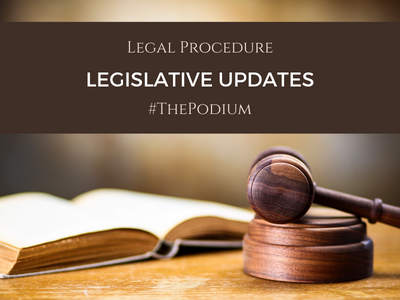
The following bills were signed by Governor Newson by the September 30, 2022, deadline for adopting proposed legislation. These bills may be of interest to legal practitioners, as some of them amend statutes and legal procedure in California.
LABOR AND EMPLOYMENT
AB 1041 (Definition of “Family Member”) – Expands the class of people for whom an employee may take leave to care for to include a designated person, who would be identified at the time the employee requests the leave. An employer would be allowed to limit an employee to one designated person per 12-month period.
Existing state law, the Healthy Workplaces, Healthy Families Act of 2014, generally entitles an employee who works in California for the same employer for 30 or more days within a year to paid sick days, including to care for an employee’s family member. AB 1041 expands the definition of the term “family member” to include a designated person.
AB 1949 (Bereavement Leave) – Requires private employers with five or more employees and public sector employers to provide employees with at least 30 days of service up to five unpaid days of bereavement leave upon the death of a family member.
CODE OF CIVIL PROCEDURE AND PROBATE CODE
SB 1279 (Guardian Ad Litem) – Amends Section 372 of the Code of Civil Procedure, and Section 1003 of the Probate Code, relating to guardians ad litem.
1) Existing law authorizes a court to appoint a guardian ad litem at any stage of a proceeding under the Probate Code to represent the interest of specified persons, including a minor or an incapacitated person, if the court determines that representation of their interest otherwise would be inadequate.
This bill would add a person who lacks the legal capacity to make a decision to that list of specified persons. The bill would require a proposed guardian ad litem to disclose to the court and all interested persons any known potential or actual conflicts of interest arising from appointment.
(2) Existing law requires a party to a civil action who is a minor, a person who lacks legal capacity to make decisions, or a person for whom a conservator has been appointed to appear in the action either by a guardian or conservator of the estate or by a guardian ad litem appointed by the court, except as specified. Existing law authorizes the court to appoint a guardian ad litem in any case when the court deems it expedient, even notwithstanding that the person may have a guardian of the estate or conservator of the estate and may have appeared by the guardian of the estate or conservator of the estate.
With respect to the appointment of guardians, this bill would replace the term “person lacking legal competence to make decisions” with the term “person who lacks legal capacity to make decisions,” as defined. The bill would require notice and a copy of a guardian ad litem application for a person who already has a guardian or conservator of the estate to be provided to the guardian or conservator of the estate, as prescribed. The bill would give the guardian or conservator of the estate 5 court days from receiving notice of the application to file an opposition to the application. The bill would require a proposed guardian ad litem to disclose to the court and all interested persons any known potential or actual conflicts of interest arising from appointment, and any familial or affiliate relationship with any of the parties.
CODE OF CIVIL PROCEDURE
SB 1477 (Enforcement of Judgments: Wage Garnishments) – An act to amend, repeal, and add Section 706.050 of the Code of Civil Procedure, relating to the enforcement of judgments concerning wage garnishments.
Existing law sets forth procedures for the levy of a judgment debtor’s wages when required to enforce a money judgment. Existing law specifies that the maximum amount of a judgment debtor’s disposable earnings for any workweek that is subject to levy shall not exceed the lesser of certain specified percentages, including 50% of the amount by which the disposable earnings for the week exceed 40 times the state minimum hourly wage. Existing law specifies certain multipliers to determine the maximum amount of disposable earnings subject to levy for any pay period other than a weekly pay period.
This bill would provide that the maximum amount of disposable earnings of a judgment debtor for any workweek that is subject to levy must not exceed the lesser of 20% of the individual’s disposable earnings for that week or 40% of the amount by which the individual’s disposable earnings for that week exceed 48 times the state minimum hourly wage. The bill would reduce the multipliers used to determine the maximum amount of earnings subject to levy for any pay period other than a weekly pay period. The bill would make these provisions operative on September 1, 2023.
Categorized in: Legal Procedure
| << previous | next >> |








